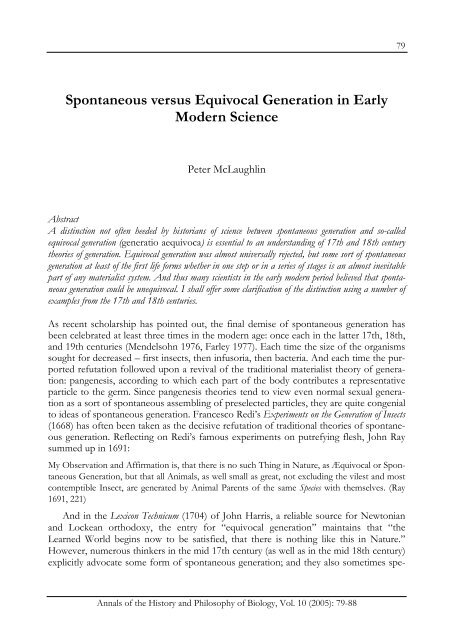Annals of the History and Philosophy of Biology
Annals of the History and Philosophy of Biology
Annals of the History and Philosophy of Biology
You also want an ePaper? Increase the reach of your titles
YUMPU automatically turns print PDFs into web optimized ePapers that Google loves.
Spontaneous versus Equivocal Generation in Early<br />
Modern Science<br />
Peter McLaughlin<br />
Abstract<br />
A distinction not <strong>of</strong>ten heeded by historians <strong>of</strong> science between spontaneous generation <strong>and</strong> so-called<br />
equivocal generation (generatio aequivoca) is essential to an underst<strong>and</strong>ing <strong>of</strong> 17th <strong>and</strong> 18th century<br />
<strong>the</strong>ories <strong>of</strong> generation. Equivocal generation was almost universally rejected, but some sort <strong>of</strong> spontaneous<br />
generation at least <strong>of</strong> <strong>the</strong> first life forms whe<strong>the</strong>r in one step or in a series <strong>of</strong> stages is an almost inevitable<br />
part <strong>of</strong> any materialist system. And thus many scientists in <strong>the</strong> early modern period believed that spontaneous<br />
generation could be unequivocal. I shall <strong>of</strong>fer some clarification <strong>of</strong> <strong>the</strong> distinction using a number <strong>of</strong><br />
examples from <strong>the</strong> 17th <strong>and</strong> 18th centuries.<br />
As recent scholarship has pointed out, <strong>the</strong> final demise <strong>of</strong> spontaneous generation has<br />
been celebrated at least three times in <strong>the</strong> modern age: once each in <strong>the</strong> latter 17th, 18th,<br />
<strong>and</strong> 19th centuries (Mendelsohn 1976, Farley 1977). Each time <strong>the</strong> size <strong>of</strong> <strong>the</strong> organisms<br />
sought for decreased – first insects, <strong>the</strong>n infusoria, <strong>the</strong>n bacteria. And each time <strong>the</strong> purported<br />
refutation followed upon a revival <strong>of</strong> <strong>the</strong> traditional materialist <strong>the</strong>ory <strong>of</strong> generation:<br />
pangenesis, according to which each part <strong>of</strong> <strong>the</strong> body contributes a representative<br />
particle to <strong>the</strong> germ. Since pangenesis <strong>the</strong>ories tend to view even normal sexual generation<br />
as a sort <strong>of</strong> spontaneous assembling <strong>of</strong> preselected particles, <strong>the</strong>y are quite congenial<br />
to ideas <strong>of</strong> spontaneous generation. Francesco Redi’s Experiments on <strong>the</strong> Generation <strong>of</strong> Insects<br />
(1668) has <strong>of</strong>ten been taken as <strong>the</strong> decisive refutation <strong>of</strong> traditional <strong>the</strong>ories <strong>of</strong> spontaneous<br />
generation. Reflecting on Redi’s famous experiments on putrefying flesh, John Ray<br />
summed up in 1691:<br />
My Observation <strong>and</strong> Affirmation is, that <strong>the</strong>re is no such Thing in Nature, as Æquivocal or Spontaneous<br />
Generation, but that all Animals, as well small as great, not excluding <strong>the</strong> vilest <strong>and</strong> most<br />
contemptible Insect, are generated by Animal Parents <strong>of</strong> <strong>the</strong> same Species with <strong>the</strong>mselves. (Ray<br />
1691, 221)<br />
And in <strong>the</strong> Lexicon Technicum (1704) <strong>of</strong> John Harris, a reliable source for Newtonian<br />
<strong>and</strong> Lockean orthodoxy, <strong>the</strong> entry for “equivocal generation” maintains that “<strong>the</strong><br />
Learned World begins now to be satisfied, that <strong>the</strong>re is nothing like this in Nature.”<br />
However, numerous thinkers in <strong>the</strong> mid 17th century (as well as in <strong>the</strong> mid 18th century)<br />
explicitly advocate some form <strong>of</strong> spontaneous generation; <strong>and</strong> <strong>the</strong>y also sometimes spe-<br />
<strong>Annals</strong> <strong>of</strong> <strong>the</strong> <strong>History</strong> <strong>and</strong> <strong>Philosophy</strong> <strong>of</strong> <strong>Biology</strong>, Vol. 10 (2005): 79-88<br />
79

















